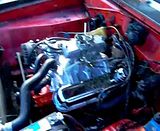If all else fails, See if your reluctor pin is still in:clock:
Just throwing this out there. I once bought a 400 T/A 400, that did the same thing. Machinest said it was carbon built up behind the valves, He was right.
Now these are 2 things I would not have thought of. My Magnum pops alot, not as bad. Even worse on deceleration.

















